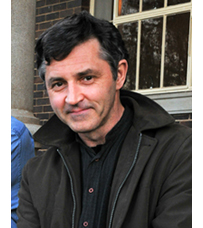A/Prof Hugh de Ferranti
Adjunct Associate Professor - Faculty of Humanities, Arts, Social Sciences and Education; School of Humanities, Arts, and Social Sciences

Email: hdeferra@une.edu.au
Biography
Hugh de Ferranti trained in musicology and composition at the University of Sydney, where he was introduced to academic studies of several genres of Japanese traditional music. He pursued practical study of biwa, a form of lute, between 1985 and 1988, and submitted a research thesis in Japanese to Tokyo National University of Arts and Music (Tôkyô Geijutsu Daigaku), from which institution he received the M.A. degree in 1989. From 1990 he entered the Ph.D. programme at Sydney, but in 1991 returned to Japan for a year as a doctoral research fellow to do fieldwork research with blind performers of the zatôbiwa tradition in the Kumamoto region of central Kyusu. He was awarded the Ph.D. in 1997 for the thesis Text and Music in Biwa Narrative: the Zatôbiwa Tradition of Kyushu, submitted to Sydney University. In the meantime he had taught both regular and summer courses on music, culture and language at the University of California, Berkeley, and San Francisco State University. From 1996-97 he was a Mellon Teaching-Research Fellow at Cornell University. In 1998 he became an Assistant Professor jointly appointed in two Departments, Asian Languages and Cultures, and Musicology, at the University of Michigan, Ann Arbor. In 2001-02 he received research grants from the Japan Foundation and the Fulbright-Hays Commission, and was accepted as an affiliated researcher at the National Museum of Ethnology, Osaka. In January 2003, he returned to Australia to join the Asian lanaguages and cultures division of the School of Languages, Cultures and Linguistics at the University of New England, where he taught Japanese culture and language until moving to the Music division (School of Arts) in 2008.
As someone who began studying biwa performance traditions soon after completing his undergraduate education, de Ferranti has always worked with Japanese poetic narratives and their musical vehicles, the singing and declaiming voice, and instrumental sound. His writings on the history, performance practice, notation systems, social and interpretive contexts for biwa narrative have appeared in The Yearbook for Traditional Music, Asian Music, Context, Musica Asiatica, Musicology Australia and The New Grove Dictionary of Music and Musicians. He has also written research papers on Japanese popular music (in the British journal, Popular Music) and the work of composer, Toru Takemitsu. He is the author of Japanese Musical Instruments (Oxford University Press, 2000), co-editor of A Way a Lone: Writings on Tôru Takemitsu (Academia Music, Tokyo, 2002), and The Last Biwa Singer (Cornell East Asia Series, 2009). His 2009 monograph was awarded the Tanabe Hisao Prize for books on Asian music in 2010; this was the first occasion on which a book in a language other than Japanese received the award. In 2007, he co-produced and documented a triple CD set, Rites and Tales with the Biwa, which was co-recipient of the Award for Superior Accomplishment in the Arts (musical recordings division), presented by the Japanese governmental Cultural Affairs Bureau.
Hugh de Ferranti initiated an undergraduate lecture course on Japanese popular music at the University of Michigan. He also taught undergraduate and post-graduate seminars on Japanese theatre, historical music traditions, and the development, reception and transformation of the canonical pre-modern text, The Tale of the Heike. At UNE, he has taught units in Japanese cultural history, Japanese language, and Ethnomusicology. He also leads the New England Taiko, a festival percussion group playing matsuri-bayashi on instruments donated by community musicians of Kanuma, Armidale's sister city in Japan.
Qualifications
B Mus (Hons) (Sydney), MA (Tokyo Geijutsu Daigaku), PhD (Sydney)

